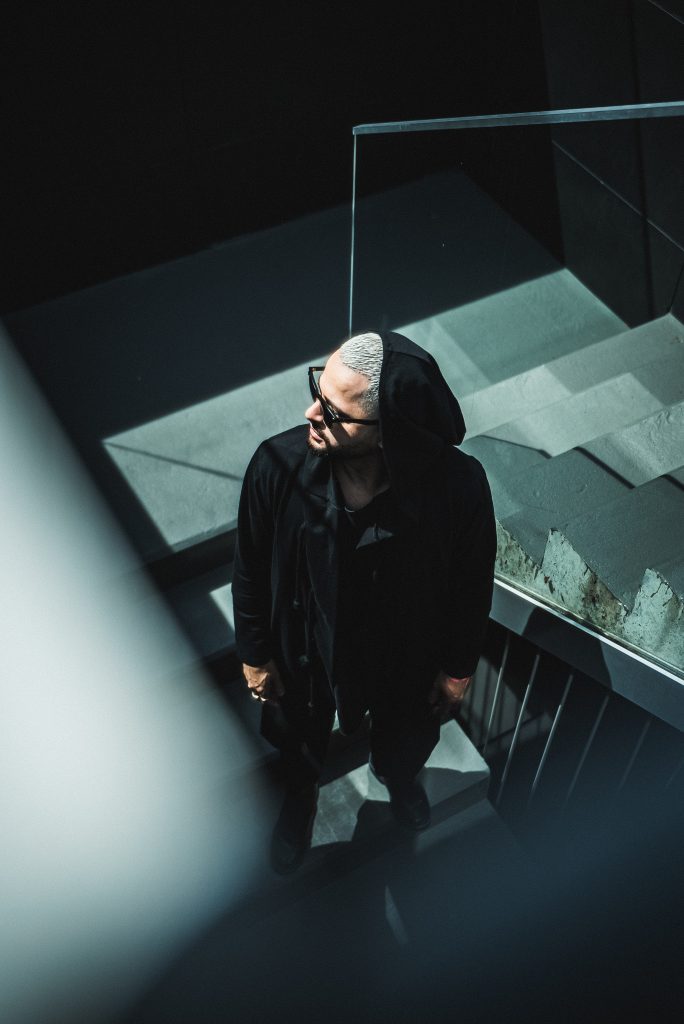
Black Hertz emerged as a trailblazing force in the high tech minimal electronic music scene after discovering his passion at local raves in 2010 and being captivated by Boris Brejcha‘s innovative style during high school, prompting him to start producing as a hobby at just 18 years old. By 2017, he launched his first official releases and founded his own record label, Acid Mind rec, quickly gaining international acclaim that led to concerts across Asia, Europe, and Russia, allowing him to transition to a full-time music career as the sole Brazilian pioneer of this genre that pulses from his heart and resonates globally. Infusing his productions with healing frequencies and deep emotional melodies, Black Hertz transforms tracks into therapeutic experiences that release negative energies through dance, helping listeners connect with themselves and elevate to a better “HERTZ” frequency—even drawing from his own challenges during the pandemic to create music that heals.
In this exclusive written interview, we sit down with Black Hertz to explore his journey, creative process, and vision for the future.
What first drew you to the raves in São Paulo back in 2010, and how did that scene shape your early interest in electronic music?
The electronic music scene in Brazil is one of the best in the world, so international DJs are always there. But what really attracted me back then was a specific style that I still play today.
How did hearing Boris Brejcha in high school spark your curiosity about producing electronic music, and what was your initial hobby setup like at age 18?
Actually, I listened to other styles (Brazilian music). My focus wasn’t on being a musician or a DJ until I went to a show that friends took me to, and I didn’t want to go. There, I discovered Boris and his sound, and that’s when I decided I wanted to convey that same emotion to people, just like that guy. My first equipment was a 512-RAM laptop and a virtual DJ. hahaha
Can you walk us through the process of launching your own label, Acid Mind rec, in 2017 alongside your first official releases?
I started producing, and there were no labels that released our style, so the first step was to become independent. Our release process is minimalist, with minimalist artwork and efficient internal and external promotion. We already have our own playlists, which helps new artists see results from their first release.
As the only Brazilian exponent of High Tech Minimal, what makes this genre resonate so deeply with you compared to other styles?
I think high tech minimal is the most dynamic style on the market. You can be melodic, deep, and introspective in one song, and in the next, play a totally danceable sound, with expressive and energetic bass, without literally losing your identity.
In your productions, how do you select specific healing frequencies to evoke deep emotions and help listeners release negative energies?
Yes, I use frequencies that work as healing, like 432 hertz, that’s why I have a Hertz (in my name).
Looking back at your background in São Paulo, how has growing up in Brazil influenced the unique elements you bring to High Tech Minimal as a producer?
My city never influenced me at all. People here are more into techno, hard techno, and melodic techno. The clubs and their routines influenced me much more than musical styles.
Technically speaking, what production techniques do you use to blend pulsating rhythms with melodies that create a therapeutic space in your tracks?
I use Cubase software, which helps me have a creative mind and a better workflow in my decision-making. I’m not a producer who uses a lot of techniques, but I really like using Waves and UAD plugins when making decisions for my mixes and masters. I pay close attention to the quality of the samples I use to help create a clear mix.
During the pandemic, how did transforming your difficult days into music help you personally, and what themes from that time still show up in your work?
During the pandemic, it was difficult; I had to cancel many shows, but in the long run, it was a good time to make music and spend time with my family… I made a lot of music, I really enjoyed my father (who is no longer with us), and I took away fond memories of Chaos.
With your music aiming to bring people to a better ‘HERTZ’ frequency, what challenges have you faced in conveying healing through High Tech Minimal on an international stage?
Well, the challenges were with the bookings, as they’re focused on artists who already sell a lot of tickets. In the beginning, we had to overcome these objections, because when Black Hertz took the stage, they understood the true message of the music. Over time, I started to get full stages as a main artist, and things are improving now. I’m happy with this new phase.
If you could collaborate with any artist from your early influences or beyond, who would it be and why?
Boris Brejcha. Why? He’s the father of my style.
Stream ‘Good things – Bongani Remix’:

